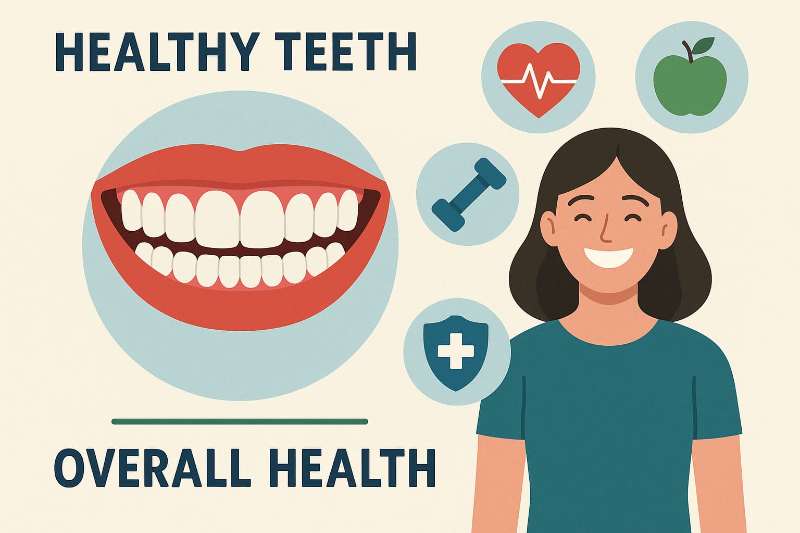Most people know that keeping your teeth clean and healthy is essential for a beautiful smile, but did you know that your oral health can significantly impact your overall health? Maintaining good dental hygiene goes beyond preventing cavities and gum disease – it plays a crucial role in your general well-being. Here’s how healthy teeth are connected to your body’s health.
1. Oral Health and Heart Disease
There’s growing evidence that links poor oral health to heart disease. Infections and inflammation in the gums, such as gum disease, can contribute to cardiovascular problems.
The Connection: Gum disease can increase inflammation in the body, which can contribute to the development of plaque in the arteries, leading to a higher risk of heart attacks and strokes.
Why it Matters: Taking care of your gums and teeth reduces the risk of heart disease by keeping inflammation in check.
Brushing, flossing, and regular dental check-ups help protect not only your gums but also your heart.
2. Diabetes and Oral Health
If you have diabetes, you may be at a higher risk of developing gum disease. Diabetes can impair your body’s ability to fight infections, making it more difficult to control oral health problems.
The Connection: High blood sugar levels can lead to dry mouth, which promotes bacterial growth in the mouth, increasing the risk of gum disease and other oral infections.
Why it Matters: Good oral hygiene helps control blood sugar levels and reduces the risk of complications from diabetes.
If you have diabetes, make sure to brush regularly, monitor your blood sugar, and visit your dentist regularly for check-ups.
3. Oral Health and Respiratory Infections
Your mouth is the gateway to your respiratory system. If harmful bacteria are present in the mouth due to poor oral hygiene, they can be inhaled into the lungs, potentially leading to respiratory infections.
The Connection: Poor oral hygiene can lead to bacteria in the mouth that might be inhaled, increasing the risk of pneumonia, bronchitis, and other lung diseases.
Why it Matters: Proper brushing and flossing help eliminate bacteria that could travel to your lungs and cause respiratory issues.
Taking care of your oral health is an easy and effective way to lower the risk of these serious respiratory conditions.
4. Pregnancy and Oral Health
Pregnant women are more susceptible to certain oral health problems, including gum disease, due to hormonal changes. Gum disease in pregnancy has been linked to premature birth and low birth weight.
The Connection: Untreated gum disease in pregnant women can increase the risk of complications like preterm birth and gestational diabetes.
Why it Matters: Maintaining good oral hygiene during pregnancy can lower the risk of these complications.
Expecting mothers should continue to brush and floss daily and see their dentist for routine check-ups.
5. Oral Health and Digestive Health
Good oral health is essential for proper digestion. The process of digestion starts in your mouth, and chewing is the first step in breaking down food. Healthy teeth and gums allow for proper chewing and the breakdown of food before it reaches the stomach.
The Connection: Poor oral health can make chewing difficult, which can lead to digestive issues and malnutrition.
Why it Matters: Healthy teeth ensure you can chew food properly, which helps your body absorb essential nutrients and aids in digestion.
By keeping your teeth healthy, you help ensure that the rest of your digestive system functions properly.
6. Healthy Teeth and Mental Well-Being
A healthy mouth isn’t just about physical health—it can also impact your mental health. People who suffer from dental pain, gum disease, or poor oral hygiene may experience stress, anxiety, and even depression.
The Connection: Chronic dental problems can lead to discomfort, embarrassment, and feelings of self-consciousness, which can negatively impact mental health.
Why it Matters: A healthy smile boosts self-esteem and reduces the mental burden of dental issues.
Good dental health can have a significant positive impact on your emotional well-being, boosting your confidence and overall quality of life.
7. Chronic Pain and Oral Health
Oral health problems, such as untreated cavities or advanced gum disease, can cause chronic pain. This discomfort may radiate throughout your face and head, affecting your daily life.
The Connection: Infections in the mouth can lead to pain that may worsen over time, causing headaches, earaches, or jaw problems.
Why it Matters: Preventing oral infections and treating dental issues early can help reduce chronic pain.
Routine dental care can prevent painful conditions that could otherwise affect your day-to-day activities.
Conclusion
Your teeth and gums do much more than just help you chew and speak. They play a vital role in your overall health, influencing everything from heart disease to mental well-being. Taking care of your oral health isn’t just about avoiding cavities – it’s about keeping your entire body in good shape. Regular brushing, flossing, and routine dental check-ups are essential for maintaining not only a beautiful smile but also a healthy body.
If you’re looking for expert dental care, get in touch with us at Oris Dental. Our team of professionals is here to help you maintain both your smile and your health.



































